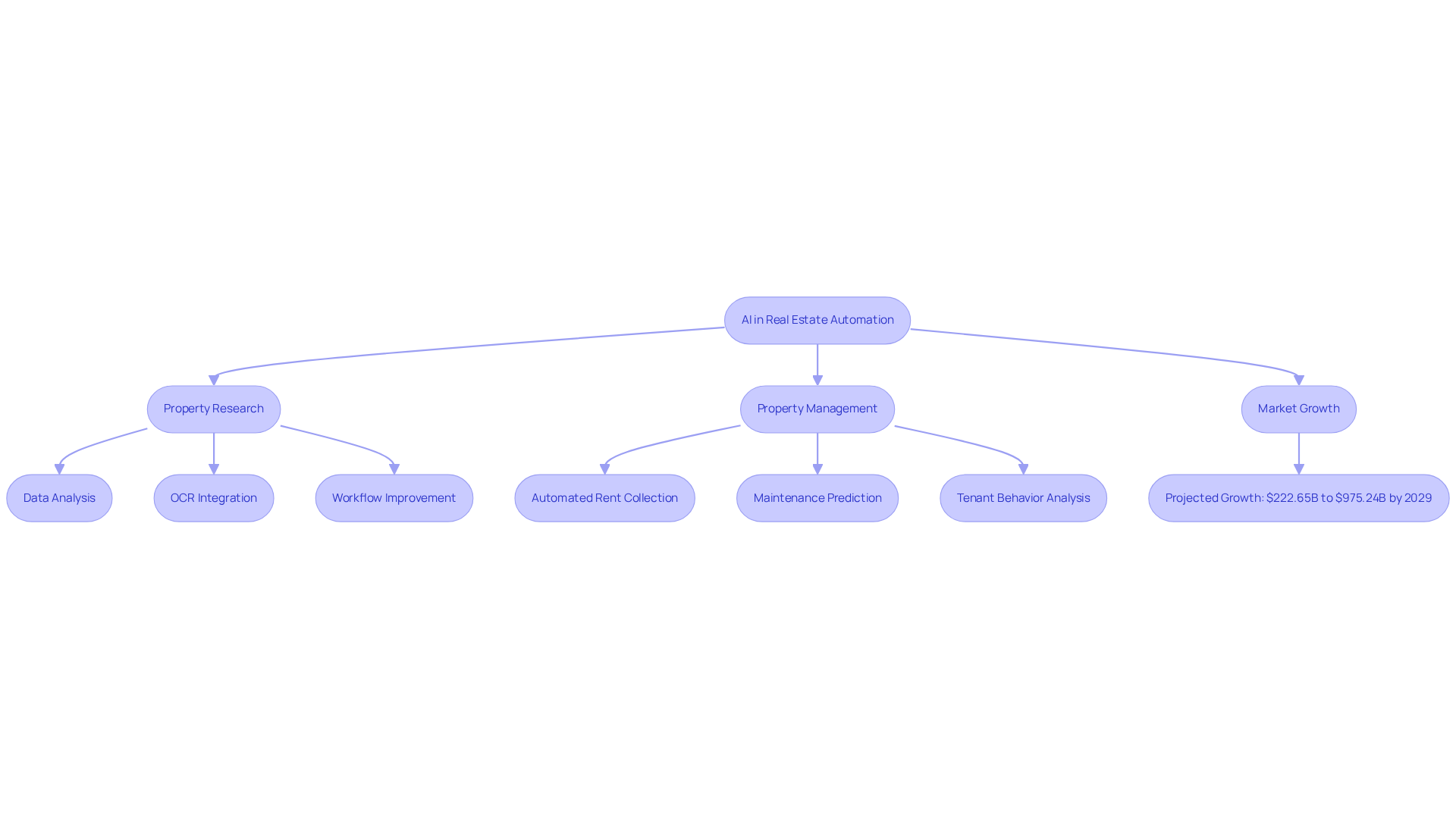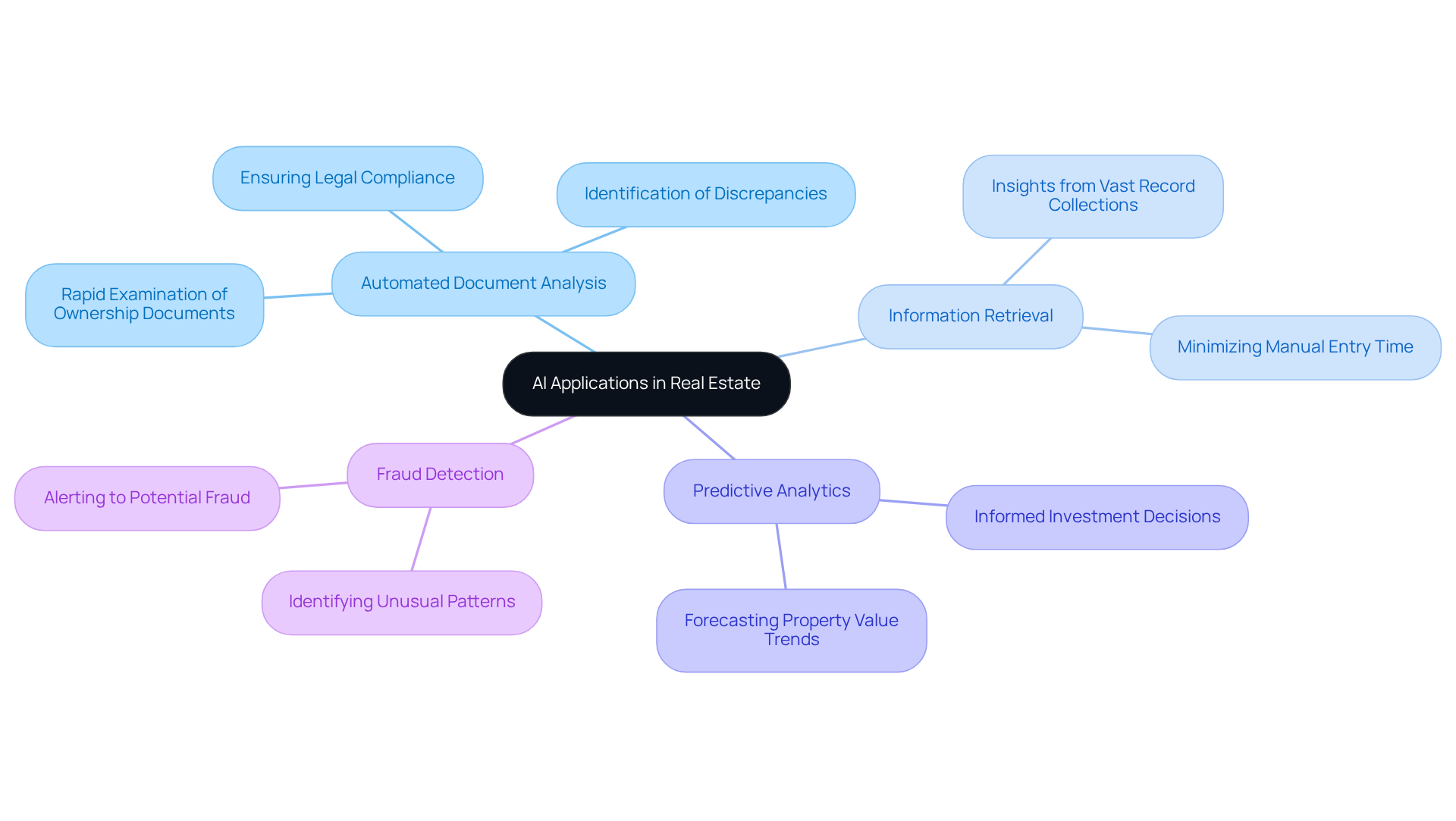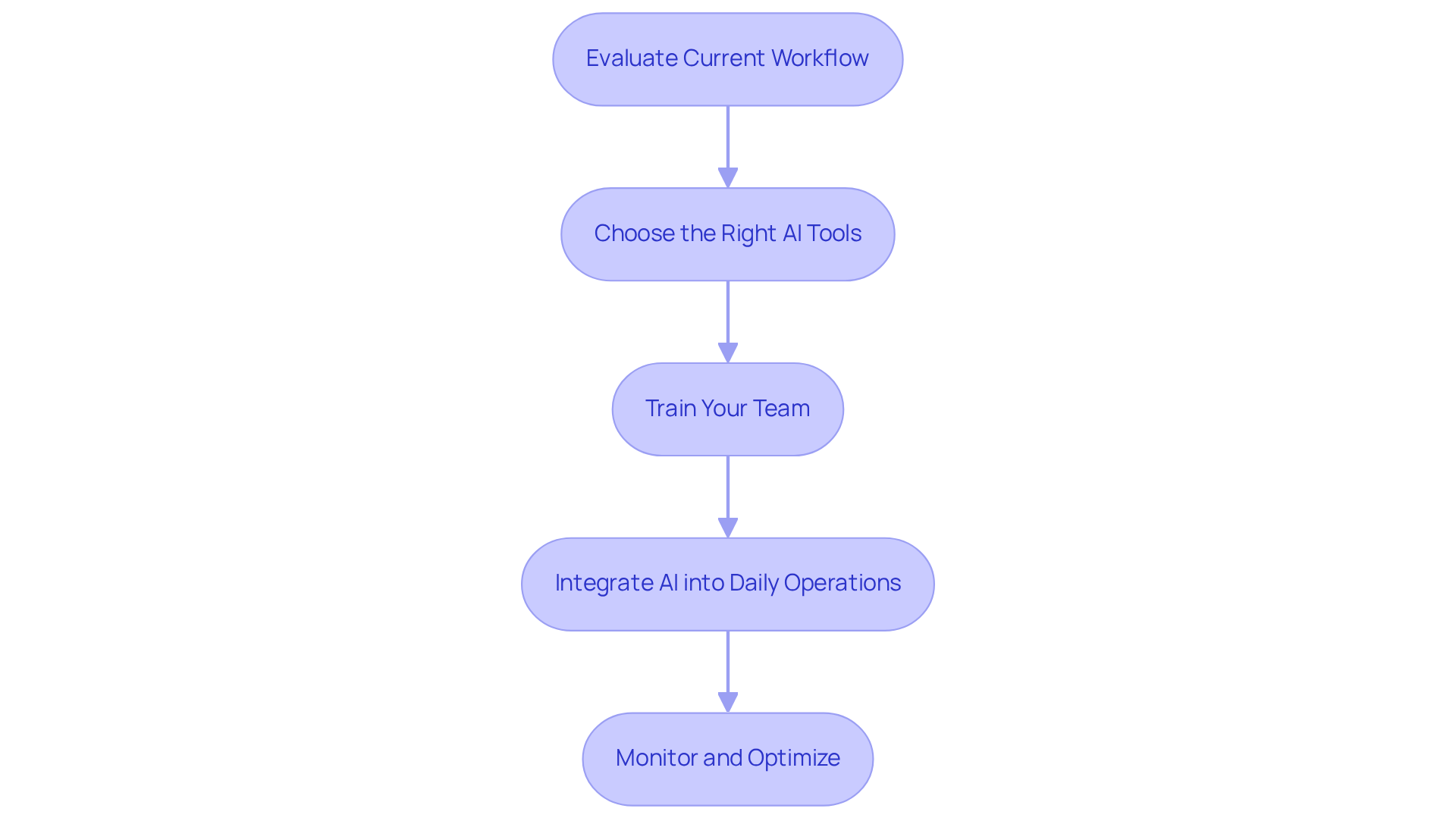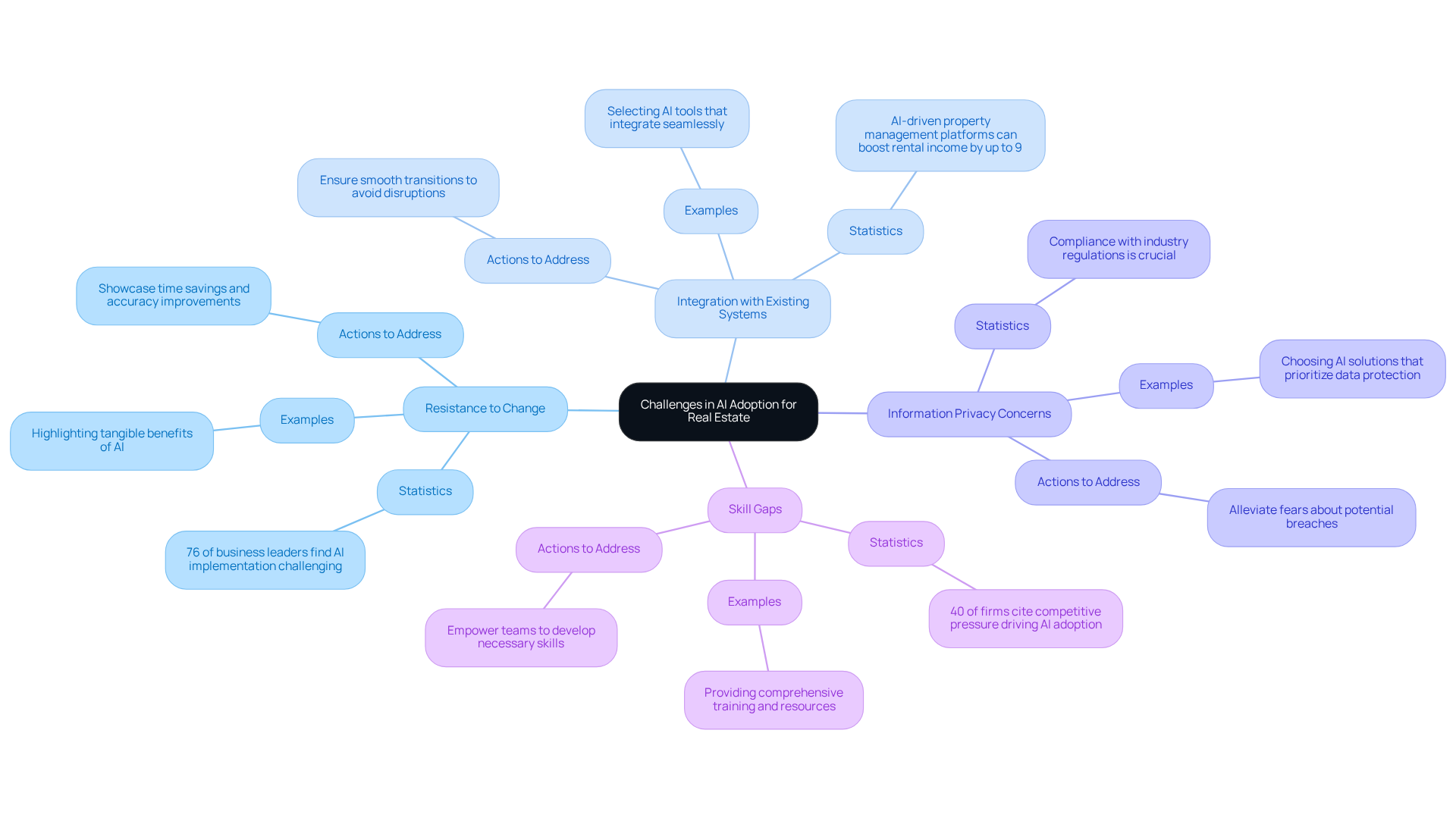Overview
AI automates real estate tasks for title research by employing machine learning algorithms and optical character recognition (OCR) technology, significantly enhancing efficiency and accuracy in document analysis and information retrieval.
The significance of accurate title research cannot be overstated, as it forms the backbone of successful property transactions.
However, the challenges faced in manual processes often lead to inefficiencies and errors. AI addresses these challenges effectively.
By automating these tasks, AI can reduce the time spent on manual processes and improve data accuracy by up to 88%.
Consequently, this technological advancement drives financial savings and boosts productivity for property professionals, making it an indispensable tool in the industry.
Introduction
AI is rapidly transforming the landscape of the real estate industry, particularly in the realm of title research. By harnessing advanced machine learning and optical character recognition technologies, AI streamlines traditionally labor-intensive tasks. This innovation allows professionals to access critical information with unprecedented speed and accuracy.
However, as the sector embraces these advancements, questions arise:
- What specific benefits can AI offer in automating real estate processes?
- What challenges must be overcome to fully realize its potential?
Exploring these dynamics reveals not only the opportunities for enhanced efficiency but also the hurdles that professionals face in adopting AI solutions.
Understand AI's Role in Real Estate Automation
AI is revolutionizing the real estate industry, particularly in property research, by illustrating how that traditionally demanded significant time and resources. By employing , AI can rapidly analyze extensive datasets from document titles, uncovering patterns and extracting pertinent information with remarkable speed and precision. The integration of further enhances this capability, converting scanned documents into editable and searchable formats. This transformation enables to efficiently identify critical details, thereby .
The profound impact of how AI automates real estate tasks on is significant. For example, can boost rental income by as much as 9% while concurrently reducing maintenance costs by up to 14%. to automate rent collection, anticipate maintenance needs, and analyze tenant behavior, ultimately enhancing lease renewal rates. Furthermore, to propose competitive pricing strategies, achieving an impressive 95% accuracy in matching buyers with properties that align with their preferences. As the sector increasingly embraces these technologies, understanding how AI automates real estate tasks reveals the potential for expedited decision-making and improved accuracy in property ownership verification, signaling a of property professionals. Additionally, the AI market within the property sector is projected to grow from $222.65 billion in 2024 to $301.58 billion in 2025, and further to $975.24 billion by 2029, underscoring the critical importance of AI integration in the industry.

Explore Key AI Applications for Real Estate Tasks
Several key applications of AI can significantly enhance real estate tasks, including the following:
- : AI systems can rapidly examine and assess ownership documents, identifying discrepancies and ensuring adherence to legal standards.
- : Machine learning algorithms can obtain essential insights from vast record collections, minimizing the time invested in manual entry.
- : to forecast trends in property values, assisting property professionals in making informed investment choices.
- : AI tools can identify unusual patterns in document records, alerting researchers to potential fraud or errors in property ownership records.
By exploring these applications, how AI automates real estate tasks and streamlines their operations to improve overall efficiency.

Implement AI Solutions for Efficient Title Research and Management
To effectively implement in title research and management, consider the following steps:
- Evaluate Your Current Workflow: Identify bottlenecks and inefficiencies in your research process. Research indicates that 62% of companies report multiple major process inefficiencies that could be resolved through automation. , depending on workflow complexity and scale.
- Choose the Right : Select AI platforms designed for title research, such as , which utilizes machine learning and optical character recognition (OCR) for swift information extraction. Companies that automate workflows can save an average of $46,000 annually, highlighting the financial benefits of choosing the right tools.
- Train Your Team: Provide comprehensive training sessions to ensure your team is proficient in using the selected [AI tools](https://blog.parseai.co/10-benefits-of-automated-chain-of-title-software-for-title-researchers). This investment in training is crucial, as to adapt to an increasingly automated workplace.
- Integrate AI into Daily Operations: Start using AI solutions in your workflow, concentrating on automating repetitive tasks like information entry and document analysis. Automation can enhance information accuracy by up to 88%, significantly minimizing mistakes in your processes. Workflow automation by up to 88%, reducing errors in budgets, forecasts, and audits.
- Monitor and Optimize: Continuously evaluate the performance of your AI tools and make necessary adjustments to enhance efficiency and accuracy. Organizations that implement automation often see a positive ROI within six months, underscoring the importance of ongoing optimization.
By following these steps, property professionals can understand how AI automates real estate tasks to simplify document research processes, ultimately enhancing productivity and operational efficiency.

Navigate Challenges in AI Adoption for Real Estate
Adopting AI in real estate presents several challenges that professionals must navigate effectively:
- Resistance to Change: Many professionals may hesitate to embrace new technologies. To counter this, it is crucial to highlight the , such as , which can lead to improved client satisfaction. Notably, 76% of business leaders find implementing AI challenging, emphasizing the importance of addressing this resistance.
- Integration with Existing Systems: Selecting AI tools that can seamlessly integrate with current software and processes is essential. This ensures that the transition does not disrupt ongoing operations, allowing for a smoother implementation. For instance, have shown to boost rental income by up to 9% while cutting maintenance costs, demonstrating the potential benefits of effective integration.
- Information Privacy Concerns: Tackling . Opt for AI solutions that comply with industry regulations and prioritize data protection, alleviating fears about potential breaches and ensuring client trust. As concerns over privacy and security grow, selecting compliant solutions becomes increasingly critical.
- Skill Gaps: To maximize the potential of AI tools, it is vital to provide . This empowers your team to develop the necessary skills for effective utilization, fostering a culture of innovation and adaptability. With , investing in skill development is essential for staying ahead.
By proactively addressing these challenges, real estate professionals can facilitate a successful transition to AI-driven title research and management, ultimately enhancing operational efficiency and positioning themselves for future growth.

Conclusion
AI is fundamentally reshaping the real estate sector, particularly in title research, by automating tasks that were once tedious and time-consuming. The integration of advanced machine learning and optical character recognition technologies enables real estate professionals to access vital information swiftly and accurately, revolutionizing the way property transactions are conducted.
Throughout this guide, the significant advantages of AI in real estate have been highlighted, including:
- Enhanced efficiency in document analysis
- Predictive analytics for informed decision-making
- Improved fraud detection capabilities
Moreover, the financial implications of adopting AI solutions are substantial, with potential savings and increased revenue opportunities underscoring the importance of embracing these technologies. Addressing the challenges of resistance to change, integration issues, and skill gaps is essential for a successful transition to an AI-driven workflow.
As the real estate industry continues to evolve, the adoption of AI technologies will not only streamline operations but also position professionals for future growth in a competitive landscape. Embracing these innovations is not merely an option; it is a necessity for those looking to thrive in an increasingly automated world. The time to act is now—invest in AI solutions and training to harness the full potential of this transformative technology and stay ahead in the dynamic realm of real estate.
Frequently Asked Questions
How is AI transforming the real estate industry?
AI is revolutionizing the real estate industry by automating tasks that traditionally required significant time and resources, particularly in property research.
What technologies are used by AI in real estate automation?
AI employs advanced machine learning algorithms and optical character recognition (OCR) technology to analyze extensive datasets and convert scanned documents into editable and searchable formats.
How does AI improve the workflow of title researchers?
AI enhances the workflow of title researchers by rapidly analyzing data, uncovering patterns, and extracting relevant information, which improves efficiency and productivity.
What are the benefits of AI-driven property management platforms?
AI-driven property management platforms can increase rental income by up to 9% and reduce maintenance costs by up to 14%, while also automating rent collection and anticipating maintenance needs.
How does AI influence tenant behavior analysis and lease renewal rates?
AI empowers property managers to analyze tenant behavior, which ultimately enhances lease renewal rates by providing insights into tenant preferences and needs.
What accuracy does AI achieve in matching buyers with properties?
AI tools can achieve an impressive 95% accuracy in matching buyers with properties that align with their preferences.
What is the projected growth of the AI market in the real estate sector?
The AI market within the property sector is projected to grow from $222.65 billion in 2024 to $301.58 billion in 2025, and further to $975.24 billion by 2029.
What is the significance of AI integration in real estate?
The integration of AI in real estate signifies a shift towards expedited decision-making and improved accuracy in property ownership verification, highlighting its critical importance in the industry.




